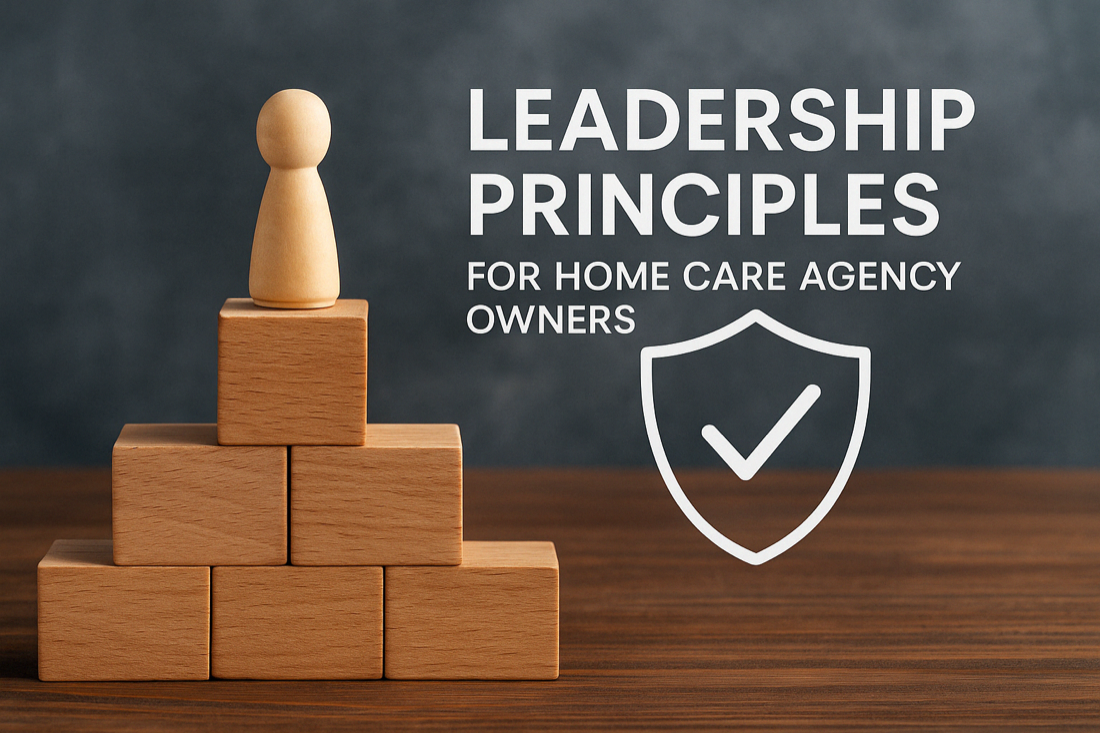
9 Must Know Leadership Principles for Home Care Agency Owners
If you’re running a home care agency, especially in a competitive state like Texas, you already know leadership isn’t just about calling the shots. It’s about showing up every single day for your team, your clients, and yourself. And to be honest, it’s not always easy.
Leadership in this field means balancing growth with compassion, solving problems without burning out, and making decisions that impact real lives. So how do the most successful home care agency owners actually do it?
Today, we’ll walk you through nine top leadership principles, designed to help you lead with clarity, confidence, and care
Here are the 9 expert-approved leadership principles that successful home care owners swear by.
1. Start with Your Team—Not Just Your Business Plan

Strong home care agencies don’t succeed because of fancy strategies. They succeed because the owner knows their team, and puts people first.
Before thinking about marketing, expansion, or referrals, ask yourself: Do I have the right people in the right roles? Do they feel supported? Do they know they matter?
Jim Collins calls it “getting the right people in the right seats.” In home care, that means more than just hiring. It means paying attention to your team’s strengths, how they communicate, and what’s really going on behind the scenes.
For example, if your scheduler is drowning and turnover is rising, that’s not just a staffing issue, it’s a leadership one.
One small agency in Dallas cut their caregiver turnover rate by 40% in six months just by reorganizing their internal team structure and promoting a field caregiver into a coordinator role. She already had the trust of the staff. They just needed someone who understood the job.
Great home care leaders don’t wait for systems to break. They build them around people who care and can lead others.
2. Don’t React to Pressure—Respond With Facts
Things move fast in this business. A caregiver calls out. A client threatens to leave. A state inspector shows up unannounced. And suddenly, you’re pulled in five directions with no time to think.
But the best agency owners don’t react emotionally. They respond with calm, clarity, and facts.
Before making a decision, they pause and ask: What’s really going on here? Do I have all the information? What does my team need from me right now?
Gary Vogel, Owner of Bayside Home Care, once said:
“Make sure you don’t react until you get all the facts. If you throw out an opinion and that information turns out to be incorrect, you lose your credibility.”
It’s simple advice but in this industry, it can save your reputation.
Tips for staying calm during high-pressure moments:
-
Train your admin team on how to gather facts quickly before escalating issues.
-
Use a clear “holding statement” when speaking to clients or caregivers while you investigate.
-
Take 10 minutes to review all available info (texts, care notes, client history) before calling anyone back.
-
Document your process so you’re not making decisions based on memory.
People look to you in moments of stress. How you show up in those moments builds or breaks trust.
3. Protect Your Culture Like It’s a Client
If one caregiver is doing great, but they’re toxic to the rest of the team, it’s a problem. Culture in home care doesn’t build itself. You have to lead it.
And it starts with what you tolerate.
Agencies that keep the wrong people, whether it’s a disrespectful office staff member or a burnout-prone scheduler, end up paying for it in turnover, client complaints, and missed opportunities. A strong culture isn’t about being nice all the time. It’s about being clear about what’s okay and what’s not.
One owner in Austin said it best: “If someone doesn’t align with how we treat people, I don’t care how skilled they are, they don’t belong here.”
Caregiver retention starts with how supported and respected your team feels. And that comes from the tone you set, every day.
4. Give Recognition That Actually Means Something

Caregivers leave when they feel invisible. Recognition isn’t a bonus, it’s a retention strategy.
That doesn’t mean handing out generic certificates once a year. It means noticing effort. Being specific. And saying thank you in ways that matter.
A caregiver who covered a shift last-minute? Thank her publicly. A scheduler who handled a tough client without drama? Mention it in your team meeting. A small act of appreciation goes a long way.
According to Gallup, caregivers who feel seen and appreciated are much more likely to stay. And in this industry, where caregiver burnout is real, that small effort adds up fast.
Easy ways to recognize your team without spending a dime:
-
Start every staff meeting with one short success story from the field.
-
Send quick thank-you texts directly to caregivers after hard shifts.
-
Create a shared whiteboard or Slack channel where anyone can shout out a team member.
-
Take 60 seconds at the end of the day to email one team member you noticed.
Think of it this way: if you can spend 15 minutes solving a schedule issue, you can spend 15 seconds saying thank you. And that 15 seconds might be what keeps your best people around.
5. Use Real Data to Back Up Your Decisions
Leadership isn’t just about trusting your gut. It’s about knowing your numbers, and using them.
What’s your caregiver turnover rate? How long does it take to fill a new case? How many caregivers are staying beyond 90 days?
If you can’t answer those questions quickly, that’s a leadership gap.
One Texas agency owner started tracking caregiver satisfaction every month. Within three months, she found out her team weekend call-outs were tied to caregivers feeling left out of decisions. They changed how they communicated, and retention went up.
Your numbers tell a story. And if you listen, they’ll tell you what to fix before it becomes a crisis.
What every home care agency should track:
-
Caregiver turnover—monthly, quarterly, and annually
-
Client satisfaction—using short, repeatable surveys
-
Fill times for new cases and emergencies
-
Retention at 30, 60, and 90-day intervals
You don’t need expensive software to start. A spreadsheet and 20 minutes a week can give you the truth. And the truth helps you lead better.
6. Put Time Into What Actually Moves the Business Forward
Everything in home care feels urgent. But not everything urgent is important.
Great leaders protect time for what matters. Hiring. Training. Quality control. Relationship building. Those are the things that build a stronger agency.
One owner blocked off two hours every Thursday—no calls, no interruptions—just time to think about long-term goals and systems. Within a year, she opened a second location with less stress than running her first one.
You can’t fix caregiver burnout if you’re drowning in admin work. You can’t grow your agency if you’re the only one solving day-to-day problems. Delegate the chaos. Focus on the foundation.
This is how owners go from surviving the week to actually leading their agency.
7. Let People See the Real You

Your team doesn’t need a perfect boss. They need a human one.
That means being honest. Sharing what’s hard. Admitting when something isn’t working. When you’re transparent, people trust you more, and they give you more.
A Houston agency owner once told her team, “I don’t have all the answers right now, but we’re going to figure it out together.” That single sentence got more buy-in than any polished speech could have.
You don’t have to share everything. But the more your team sees your effort, your care, and your willingness to be real, the more they’ll stay committed to what you’re building.
That’s leadership they can believe in.
8. Take Care of Yourself or Risk Losing the Whole Thing
This business will take everything from you if you let it. The calls don’t stop. The problems don’t slow down. The pressure is constant.
But if you burn out, your agency suffers. Your team feels it. Your clients feel it.
Leadership means showing up at your best. And that only happens when you protect your energy.
Take a break. Block off your Sunday. Talk to someone who gets it. Say no to things that don’t matter.
42% of small business owners report burnout. In home care, it’s likely higher. You can’t pour into your team if your tank is empty.
So take care of yourself before it becomes a crisis. That’s not selfish. That’s smart.
9. Keep Learning—Especially From the People Closest to the Work
You don’t need another certificate on the wall to be a better leader. You need to keep learning from your team, your clients, and the people who see the agency up close.
One of the best agency owners I know said her best training came from listening to caregivers during shift handoffs. That’s where the real problems, and real solutions show up.
Ask questions. Shadow a shift. Sit with your scheduler. Listen to your intake calls. Every corner of your agency has something to teach you.
Leadership isn’t about having all the answers. It’s about staying curious enough to keep getting better.
Final Word
If you're in this business, you're already doing one of the hardest jobs out there. These principles aren't theory. They’re the everyday habits of owners who lead strong teams, keep good caregivers, and grow agencies that actually last.
Read them again. Share them with your office manager. Bring them into your next team meeting. You don’t have to fix everything in a day. But every strong decision adds up. That’s leadership in this field.
So the question isn’t if you're a leader. You already are. The real question is, what kind of leader are you becoming?
Let’s build the kind that makes home care better for everyone involved.